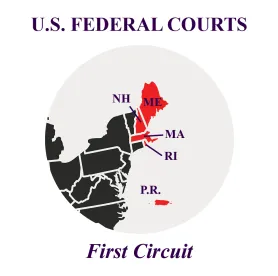The US Court of Appeals for the First Circuit affirmed dismissal of a copyright infringement claim for failure to register the copyright and affirmed summary judgment against the plaintiff on related state law claims where the plaintiff was deemed to have admitted statements that undermined its claims. Foss v. Marvic Inc., Case No. 20-1008 (1st Cir. Apr. 12, 2021) (Lynch, J.)
In 2006, sunroom purveyor Marvic contracted with graphic designer Foss to create a marketing brochure. Foss presented a $3,000 estimate, which Marvic paid, and Marvic began using the brochure soon after. In 2018, Foss (pro se) filed suit, demanding $264,000 for alleged copyright infringement on the basis that in 2016, she discovered that Marvic had been using a modified version of the brochure in print and online without asking for or receiving her permission. Foss alleged inaccurately that she had “applied for official U.S. Copyright Registrations” for the brochure.
Marvic moved to dismiss, and Foss filed an amended complaint stating six causes of action, including copyright infringement and five state-law claims. Foss alleged that she had registered the brochure with the US Copyright Office, but in fact she had only applied (after filing the original complaint) for registration. Marvic moved to dismiss the copyright and breach of contract claims. Foss did not oppose, and the district court dismissed the case. Foss then moved to reopen the case, a motion that the district court granted. Foss filed an opposition to Marvic’s earlier motion to dismiss and retained counsel, who first appeared on the day the district court heard Marvic’s motions.
In support of dismissal, Marvic argued that Foss had not established registration of her copyright, noting the then-existing circuit split as to whether a mere application or successful registration was required to support a claim of infringement in federal court. The First Circuit stayed the case pending the Supreme Court’s decision in Fourth Estate. After the Supreme Court held that successful registration is required, the district court lifted the stay and dismissed the copyright claim but not the breach of contract claim.
Later, Marvic served a request for admissions, to which Foss’s counsel failed to respond. Marvic moved that the statements in its request be deemed admitted. The district court granted the motion. Two weeks later, Foss’s counsel moved to withdraw, having been suspended from the practice of law.
Foss, pro se again, moved for reconsideration and for more time to respond to the request for admissions, but the district court denied the motions. Marvic moved for summary judgment on the state law claims, which the district court granted, largely relying on Foss’s deemed admissions. Foss appealed.
The First Circuit held that it was not error to dismiss Foss’s copyright claim under Fourth Estate. The Court rejected as waived Foss’s argument that the district court should have stayed the case pending registration since Foss had not sought such relief below. The Court also rejected Foss’s argument that dismissal became improper when the failure to register was cured since the registration did not occur until after the claim had been dismissed.
The First Circuit next held that it was not an abuse of discretion for the district court to deny Foss’s motion to withdraw her deemed admissions because “[g]iven the case’s long history marked by repeated delays by Foss and the erratic nature in which she chose to prosecute it, Marvic would have been prejudiced if Foss were allowed to further delay the case by withdrawing her admissions.” Given that the admissions remained part of the record, the Court affirmed the grant of summary judgment on Foss’s state law claims.
Practice Note: The Court’s decision that Foss had waived a stay pending registration leaves open the question of whether a district court should grant such a stay if requested. Given the statutorily limited damages period in copyright infringement actions, it may be advantageous for some plaintiffs to file suit based on a copyright application with a contemporaneous request for a stay pending actual registration. Future cases will determine whether such a tactic is permissible.



 />i
/>i

